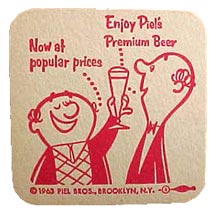Here are 10 things you should know about Paul Lukas, born 129 years ago today. He arrived in Hollywood as the silent era was winding down and had to scramble to adapt to talking pictures.
Tag: advertising
10 Things You Should Know About Roger Pryor
Here are 10 things you should know about Roger Pryor, born 120 years ago today. He enjoyed success on Broadway, in films, on radio and as the leader of a dance orchestra.
Pitch perfect: advertising
This week, as part of our ongoing series of collections of old advertising slogans, culled from a 1949 book called American Slogans, we’re getting a little meta. This week’s slogans are taken from companies that trafficked in advertising — large ad firms that are still powerful today, newspapers, marketers of promotional doodads, you name it:
Advertise and realize (Pencil Specialty Co.).
Advertising is the power of an idea multiplied (D’Arcy Adv. Co.).
Advertising that follows through to sales (Lithographers Nat. Assn.).
Advertising makes sense, makes dollars (John A. Lane).
Advertising with a basic idea (J. Walter Thompson Co.).
Always remember, the Diamond Advertising Service doesn’t cost–it pays.
An agency is known by the clients it keeps (Gottschalk-Humphrey).
Better business is our aim (Business Adv. Agency).
Bright by day, light by night (Pyrograph Adv. Sign Corp.).
Budgeteer (Specialists in increasing patronage), Carl Morgan Associates.
Builders of business (Willmark Service System).
Built on bedrock (Johnson, Read & Co.).
Business is good, but advertising makes it better (Cornelia Evans).
Color in advertising (Munro & Harford Co.).
Constant excellence is the key to success (N.W. Ayer).
Creators of direct mail literature (D. H. Ahrend Co.).
Customer patronage (Carl Morgan Associates).
Displays that move goods (Julian Mass Co.).
Economical advertising emoplys merchandised advertising (New Eng. Merch. Inc.).
Eyes have it, The (Transit Advertisers, Inc.).
Read More »
On being popular—and popularly priced
We spent much of yesterday poring over vintage tchotchkes, clothes, and ephemera at various flea markets and vintage emporiums, and one yellowed poster-board advertisement for beer (Pabst Blue Ribbon — not Piels, as pictured) caught our eye.
 “Now at popular prices!,” the poster announced proudly — which brought two or three things to mind for us.
“Now at popular prices!,” the poster announced proudly — which brought two or three things to mind for us.
First, we wonder when and how the term “popular prices” fell out of use. It’s a usage that was once quite frequently seen, and we kind of like it. Prices people can get behind!
And we were taken aback a bit by the notion that PBR, a beer now widely thought of as bargain beer, was ever sold at anything higher than “popular prices.” We know that products often sink in the collective esteem of the public, and sometimes they rise, mostly on the strength of savvy marketing, but touting a beer as now available at newly lower prices strikes us as admitting defeat, in marketing terms.
Though, we suppose, if a product was long viewed by average Joes and Jills as high-end and pricey, making it available at popular prices might have been viewed as purely a positive thing and a surefire way to boost sales. But that strikes us as a panicky move likely to yield only a short-term benefit. It seems unlikely a product, having surrendered its status as a luxury item, could ever regain its high-end cachet.
But as we said above, sometimes it works the other way around. We read somewhere that Cutty Sark, for years positioned as a budget-priced scotch, was transformed into a premium whiskey merely by marketing it as such. The price was increased significantly, and an extensive ad campaign was launched with the intent of altering the imbibing public’s perception of the Cutty Sark brand.
It worked. While Cutty is far from being the current “it” brand of scotch (and hasn’t been for a long time), it’s still perceived as a premium whiskey and has a small but loyal following it might never have acquired if that marketing makeover hadn’t been undertaken all those years ago.
That campaign moved Cutty from being popularly priced to the top shelf, and the whiskey itself went unchanged. Only the public’s perception of it was altered.
Of course, that’s nothing compared to the 180-degree turnaround managed by Philip Morris with their Marlboro cigarettes. Once marketed as a “lady’s cigarette” to women of refinement everywhere — the brand’s slogan in the 1920s was “Mild As May” — Marlboro eventually came to be positioned, instead, as the smokes purportedly preferred by rough, tough cowpokes.
That drastic a transformation requires some serious marketing muscle and know-how.
